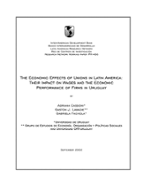The Economic Effects of Unions in Latin America: Their Impact on Wages and the Economic Performance of Firms in Uruguay
Date
Sep 2002
This study examines the impact of unionization and the level of centralization in bargaining, at the level of the industry or the firm, on wages and on the economic performance of firms within the manufacturing sector in Uruguay, using a panel of establishments for the period 1988 to 1995. The main findings suggest that unionization increases wages and employment and promotes investment due to firms substituting labor by capital. Unions tend to organize in those plants with highest rates of profits, but promote increases in productivity and prevent profitability increases. Given the negative effect of unionization at the industry level on the rate of growth of profitability of firms, results also suggest that unions tended to organize and to be stronger in those sectors in which extra rents were higher due to monopoly power.



